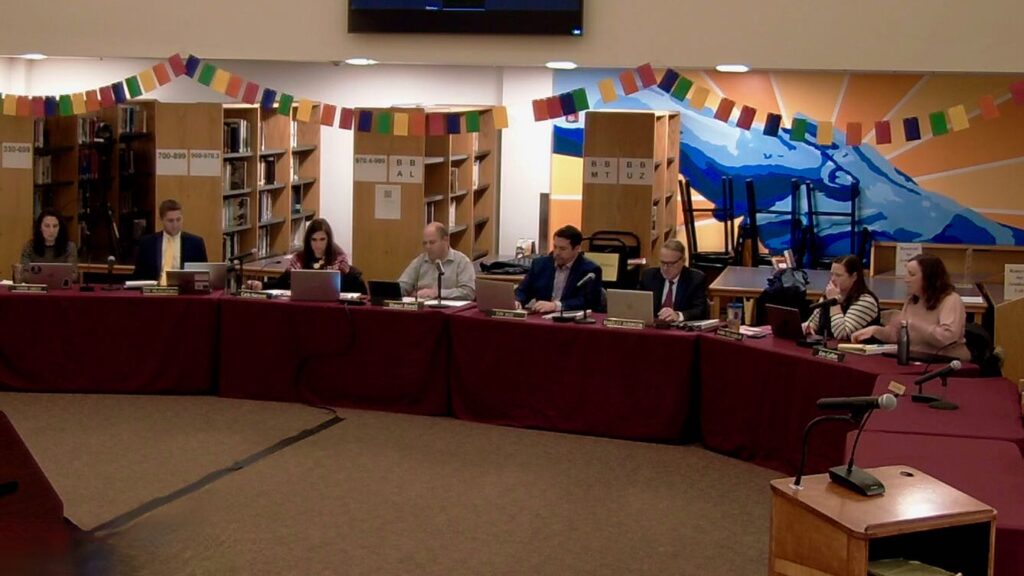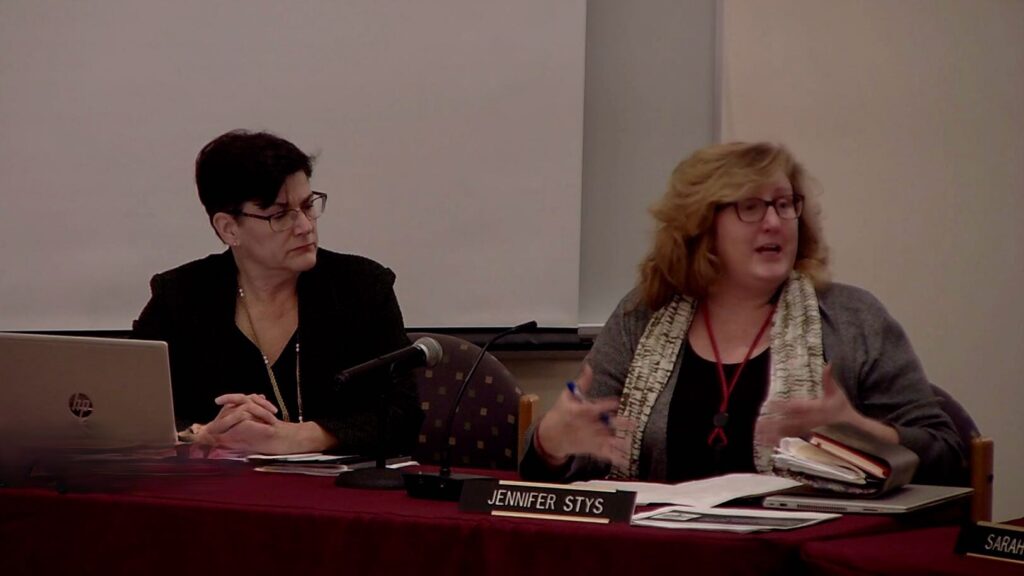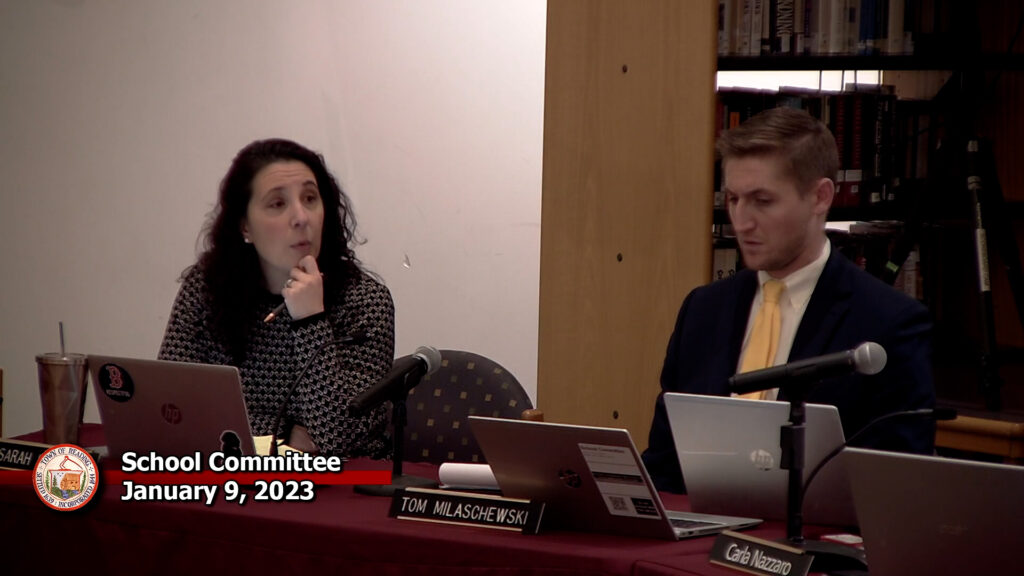
Reading, MA — The School Committee continued to examine the Superintendent’s recommended fiscal year 2024 budget on Monday night. Superintendent of Schools Thomas Milaschewski presented the final two cost centers, regular day and special education, to the committee as well as a looked at how new “investments” will aid towards the district’s strategic goals.
The Regular Day cost center is the largest of the budget line items and comprises 59.1% of the overall budget. Milaschewski is recommending a $31,954,246 budget to the committee, which is a 7.6% increase over FY 2023. Most of the increase, $2,249,073, is for personnel, while only $36,333 of the increase is for non-personnel.

Assistant Superintendent for Student Services Jennifer Stys presented the special education budget request of $16,716,146 to the committee. This is a decrease of $214,975 from FY 2023. Stys emphasized that the decline does not mean a reduction of services but instead reflects one unassigned out of district placement fee. There is also a plan to terminate the POST program agreement with Wakefield, as well as a reduction in legal service hours. There is an expected increase in funding from the state circuit breaker, though there is an increase of 14% in private day costs. School Committee chair Shawn Brandt echoed Stys sharing that there is actually increased investment in personnel in the budget.
Stys then reviewed what new budget items would be part of the supportive and safe learning environment district strategic goal. She noted that major investments were made in this area in FY 2023. The proposed budget begins the two-year process of adopting positions included in the expiring ESSER grants. FY 2024 includes two secondary counselors, one special education teacher at the middle school level, and two additional team chairs.
There will also be an exploration of social and emotional learning curriculum, a continuation of the Project Pathway Program at Reading Memorial High School (RMHS), a one-to-one nurse for a specific student, a middle school adjustment counselor and METCO Coordinator, and a METCO coordinator for RMHS. The latter two will only require one additional person as a few positions will be adjusted. METCO Director Kurtis Martin shared that the adjustment counselors and METCO coordinators are “great for the culture of a building.”

Assistant Superintendent for Teaching and Learning Sarah Hardy pointed out that most of the new investments included in the budget are being made for the district strategic objective of coherent instructional systems. These investments include a decrease in full-day kindergarten tuition from $3,600 to $2,650, a new elementary learning center teacher, expanding the teacher mentoring for new teachers program into a second year, and curriculum content reviews for middle and high school science and world languages.
School Committee Thomas Wise questioned how the world languages review would be performed, given that the district made a significant investment for a new curriculum in this area in 2021. Hardy answered, stating that the review would be more about assessment and instructional practices given new state frameworks, vertical alignment and less about a shift in materials.
Hardy spent significant time explaining the largest investment request, which is to add assistant principals for each of the five elementary schools. “Assistant Principals are essential to uphold all the work going on,” Hardy explained. Killam Elementary School Principal Sarah Leveque continued to explore the impact assistant principals at the elementary level could have on schools and students. She detailed that assistant principals would bolster and expand instructional leadership, strengthen family and community partnerships, aid in staff retention by creating a leadership pipeline for educators who are looking to advance, increase feedback to teachers and staff through shared evaluation responsibilities, and expand opportunities for productive collaboration between groups of teachers.
School Committee members Carla Nazarro and Erin Gaffen expressed excitement for the plan. Gaffen noted that assistant principals had been under discussion for many years. Wise also endorsed the plan, adding that he hopes one of the outcomes is to aid in the retention of the principals as well.
STEM Curriculum Coordinator Heather Leonard and Humanities Curriculum Coordinator Erin Burchill presented the concept of math coaches for grades kindergarten through eight. Burchill explained, “Coaching advances educators’ ability to apply what they are learning [for use] in their classrooms.” Leonard added that the addition of coaches would allow the district to internalize previously externally provided training. As she continued to explain the role of coaches, Burchill noted that the role is a personal one.
“Coaching is about relationship building.” Burchill declared.
Leonard continued stating that the benefits of coaching often extend beyond the influence of the individual coaches as teachers who have been coached in a particular area become resources to other teachers.
Though enthused by the prospect of coaches, School Committee member Sarah McLaughlin questioned whether or not two coaches are enough. Leonard answered, sharing that there is a cautionary tale regarding going too big too quickly in this arena and that time will be needed to build the structure as to how the program will actually work.
Karen Hall, director of the multilingual learner (MLL) program, reported that there are sixty such learners in the district this year, ten more than last year. Most significantly, thirty-seven of these are beginning English learners, requiring two to three periods a day of specialized instruction. This has led to a request for a 1.5 full-time equivalent (FTE) increase in teachers for the program. She also noted that MLL students in Reading speak nineteen different languages as their primary language, with almost half speaking Portuguese.
Special Education coordinator Allison Wright explained the need for a system-wide transition specialist who will support 14-22-year-olds in the district. She also emphasized the need for an additional Board Certified Behavior Analyst to perform functional behavior assessments for the SOAP and E.M.B.R.A.C.E programs. Program administrators to supervise specialized programs are also included in the recommended budget.
Director of Finance Susan Bottan closed the discussion by sharing that $8,000 had been added to create, publish, and distribute an annual district report for the community as part of the improved school operations district strategy.
The School Committee will hold a public hearing on the budget on January 19 and will vote on the budget on January 26. The School Committee adjourned at 9:30pm.
